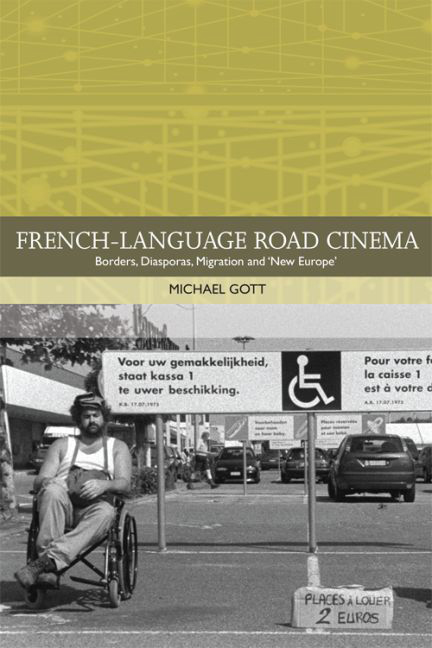Book contents
- Frontmatter
- Contents
- Acknowledgements
- List of Illustrations
- Traditions in World Cinema
- Introduction
- 1 Mapping the Hybrid European Road: French Connections, European Traditions and American Influence?
- 2 Remapping the European Road
- 3 Cowboys, Icebergs, Anarchists and Toreadors: The Paradoxes and Possibilities of the Francophone Belgian Road Cinema
- 4 Travelling Beyond the National: Mobile Citizenship and Flexible Identities in French-language Return Road Movies
- 5 The End of the Road? Dark Routes and Urban Passageways
- Conclusion
- Works Cited
- Index
3 - Cowboys, Icebergs, Anarchists and Toreadors: The Paradoxes and Possibilities of the Francophone Belgian Road Cinema
Published online by Cambridge University Press: 12 September 2017
- Frontmatter
- Contents
- Acknowledgements
- List of Illustrations
- Traditions in World Cinema
- Introduction
- 1 Mapping the Hybrid European Road: French Connections, European Traditions and American Influence?
- 2 Remapping the European Road
- 3 Cowboys, Icebergs, Anarchists and Toreadors: The Paradoxes and Possibilities of the Francophone Belgian Road Cinema
- 4 Travelling Beyond the National: Mobile Citizenship and Flexible Identities in French-language Return Road Movies
- 5 The End of the Road? Dark Routes and Urban Passageways
- Conclusion
- Works Cited
- Index
Summary
Films covered: Quand la mer monte (Yolande Moreau and Gilles Porte, 2004), L'iceberg (Dominique Abel, Fiona Gordon and Bruno Romy, 2005), Eldorado (Bouli Lanners, 2008), Les folles aventures de Simon Konianski/ Simon Konianski (Micha Wald, 2008) and Aaltra (Gustave de Kervern and Benoît Delépine, 2004, France/Belgium)
‘Where are we?’ Thus is the question posed by one of a motley pair of travellers in Bouli Lanner's acclaimed 2008 Eldorado (Belgium/France) after both passenger and driver drift into sleep on the road, causing their car to careen into seemingly uncharted wilderness. As we have seen in the previous chapter, the road movie has increasingly become a privileged mode of expression for contemporary European directors attempting to answer this very question. Filmmakers have hit the road in order to come to terms with a protean European landscape marked by shifting conceptions of identity and citizenship in the wake of events such as the collapse of communism, EU expansion, the Schengen Agreements and various ‘new migrations’ (Mazierska and Rascaroli 2006: 139–41) that have ensued. In short, road movies have experienced what Wendy Everett terms a ‘boom’ in Europe precisely because they are uniquely suited to represent ‘postmodern identity as essentially fluid and migratory (2009: 165–6). This chapter will consider this broadly European issue from the vantage point of the Belgian cinema industry, in the process bringing to the fore questions of how national specificity asserts itself within what is in many ways a fundamentally transnational cinematic category and to what extent this specificity is representative of ‘Belgian-ness’. This chapter takes a cue from the travellers in Eldorado and attempts to answer the questions: ‘what, and where, is Belgian road cinema?’ Doing so involves considering the European-ness of Belgian film as well as its national specificity and connection to wider French-language cultural categories and industries.
So far we have used Jason Wood's attempt to delineate road cinema as a starting point for a basic categorical definition for this protean and malleable category of filmmaking: ‘in archetypal terms, road movies commonly entail the undertaking of a journey by one or more protagonists as they seek out adventures, redemption or escape from the constricting norms of society and its laws’ (2007: xv).
- Type
- Chapter
- Information
- French-language Road CinemaBorders, Diasporas, Migration and 'New Europe', pp. 86 - 117Publisher: Edinburgh University PressPrint publication year: 2016



